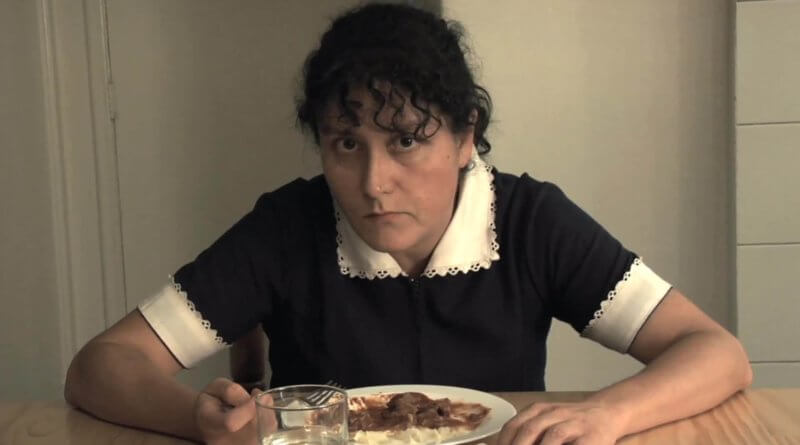Review: The Maid (La Nana, 2009) ★★★★
It is not easy to infuse comedy into a story revolving around class differences, especially without succumbing to crass jokes and offensive stereotypes. In South American countries in particular, maids and servants are often grossly underpaid, undervalued, and frequently the butt of the joke in films and television. Much more than in the United States, “the help” is expected to be on call 24/7 for their upper class employers, all in exchange for a place to sleep and a horrible wage. This disparity, while terrible in reality, has become a source of humor that is somewhat unique to Latin American culture. The image of the destitute, but nonetheless loyal maid is best exemplified in famed Argentinian comic, Antonio Gasalla’s portrayal of Kika, a middle-aged maid who passively accepts her miserable existence, and is always denied even the most meager of requests. While Chilean director Sebastián Silva does not play with this dynamic as much as expected in The Maid, it is still a necessary device underpinning the narrative.
The eponymous maid in this comedy-drama is Raquel (Catalina Saavedra), the tight-lipped woman who has dutifully served the same upper-middle class family for over 23 years. Her employers, Pilar (Claudia Celedon) and Edmundo (Alejandro Goic), are very attached to Raquel, as is their son, Lucas (Agustin Silva). However, Raquel maintains an ambivalent relationship with their teenage daughter, Camila (Andrea Garcia-Huidobro). When Raquel struggles to finish all the daily chores and begins having fainting spells, Pilar insists on hiring additional help. Raquel is staunchly against the idea, and, fearing that these intruders will undermine her relationship with the family, does everything in her power to oust each new maid without remorse.
The film relies heavily on the the quality of Saavedra’s performance as Raquel, and thankfully she is completely believable as the bitter, scheming maid. She spreads lies, actively undoes the work of her competition, and even locks them out of the house and pretends not to hear their pleas for help. Raquel is ruthless, and this is what makes the film work so well. It is funny because there is a certain truth to it. For anyone who has experienced life with servants, particularly in South American countries, there tends to be a barrage of back-biting and infighting, all for the sake of boosting one’s image in the eyes of the family. There is a strange love-hate relationship that is common between these maids, cooks, gardeners, etc. and their employers. The employers supply work for those who have few other options, often providing them with a free living space, in addition to a modest income and a few other perks. However, this usually comes at a steep price. Employees are given very little (if any) time off, and are expected to be completely loyal and accepting of the family’s every whim.

While Raquel’s employers in the film generally treat her as a member of the family, to a degree, there is still a pervasive air of snobbishness and disregard for her needs. Early in the film, the family throws a birthday party for Raquel, who is almost too shy to make an appearance. Only minutes after accepting her presents, Raquel offers to clean everything up, and while Pilar initially resists, she quickly gives in when she considers the fact that no one else is inclined to do the work.
The most interesting part of The Maid is that it dances the line between being an elitist and egalitarian comedy. On the one hand, the film never portrays the family as decidedly caring, and we are always aware of the difference in class status between Raquel and her employers. Whenever it seems as if Raquel is just one more member of the family, this is undone by someone barking orders at her or quietly resenting her for even the slightest of mistakes. On the other hand, the comedy of the film arises, in part, from the pathetic reality that is Raquel’s life. She is a grown woman who sees her employers as her surrogate family, and yet she is relegated to a tiny bedroom, given little time off, and considers paltry pleasures to be the height of luxury. We are meant to laugh at her misery, and despite how it sounds, it actually works quite well. Of course, this is not all that makes The Maid so humorous. It is due in large part to the many pranks and misdeeds Raquel commits against the other maids, fiercely defending the territory that is not even her own.
Stylistically, The Maid has a very naturalistic, gritty quality to it. At times, the camera work and visual quality almost look like a home movie, but this lends to the emphasis on Raquel’s station in life. Her life is low-quality, so why shouldn’t the image be as well? We see her life as it is, without frills or embellishments. While her character does grow throughout the film, she never loses those qualities that make her unique, and yet somehow indicative of the bitter, resentful, and completely disadvantaged servile class. She slaves away for pennies, makes little or no advancement in life, but never loses her love for the illusory place she calls home.
Rating: ★★★★ out of 5
If you’d like to watch The Maid , it is currently available to rent or purchase via Amazon here.

